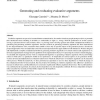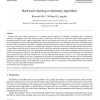14084 search results - page 2718 / 2817 » A Theory for Game Theories |
AI
2006
Springer
13 years 9 months ago
2006
Springer
Evaluative arguments are pervasive in natural human communication. In countless situations people attempt to advise or persuade their interlocutors that something is desirable (vs...
AI
2006
Springer
13 years 9 months ago
2006
Springer
Starting from some simple observations on a popular selection method in Evolutionary Algorithms (EAs)--tournament selection--we highlight a previously-unknown source of inefficien...
AIM
2006
13 years 9 months ago
2006
maintain awareness of its environment for a long period of time. Additionally, knowledge-intensive agents must be engineered such that their knowledge can be easily updated as envi...
AIS
2006
Springer
13 years 9 months ago
2006
Springer
Today's computer network technologies are sociologically founded on hunter-gatherer principles; common users may be possible subjects of surveillance and sophisticated Interne...
EJC
2008
13 years 9 months ago
2008
Gerards and Seymour (see [T.R. Jensen, B. Toft, Graph Coloring Problems, Wiley-Interscience, 1995], page 115) conjectured that if a graph has no odd complete minor of order p, the...



